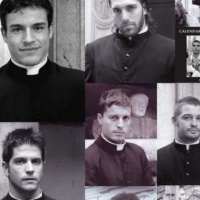
Emile Durkheim (Photo credit: Wikipedia)
The role of belief in religion is greatly overstated, as anthropologists have long known. In 1912, Émile Durkheim, one of the founders of modern social science, argued that religion arose as a way for social groups to experience themselves as groups. He thought that when people experienced themselves in social groups they felt bigger than themselves, better, more alive — and that they identified that aliveness as something supernatural. Religious ideas arose to make sense of this experience of being part of something greater. Durkheim thought that belief was more like a flag than a philosophical position: You don’t go to church because you believe in God; rather, you believe in God because you go to church.
–ooOOoo–
Emile Durkheim –
The Sociology of Religion
Durkheim’s earlier concern with social regulation was in the main focused on the more external forces of control, more particularly legal regulations that can be studied, so he argued, in the law books and without regard to individuals. Later he was led to consider forces of control that were internalized in individual consciousness. Being convinced that “society has to be present within the individual,” Durkheim, following the logic of his own theory, was led to the study of religion, one of the forces that created within individuals a sense of moral obligation to adhere to society’s demands.
Durkheim had yet another motive for studying the functions of religion–namely, concern with mechanisms that might serve to shore up a threatened social order. In this respect he was in quest of what would today be described as functional equivalents for religion in a fundamentally a-religious age.
Durkheim stands in the line of succession of a number of French thinkers who pondered the problem of the loss of faith. From the days when the Jacobins had destroyed Catholicism in France and then attempted to fill the ensuing moral void by inventing a synthetic Religion of Reason, to Saint-Simon’s New Christianity and Comte’s Religion of Humanity, French secular thinkers had grappled with the modern problem of how public and private morality could be maintained without religious sanctions. They had asked, just like Ivan Karamasov: “Once God is dead, does not everything become permissible?” Durkheim would not have phrased the question in such language, but he was concerned with a similar problem. In the past, he argued, religion had been the cement of society–the means by which men had been led to turn from the everyday concerns in which they were variously enmeshed to a common devotion to sacred things. By thus wrenching men from the utilitarian preoccupations of daily life, religion had been the anti-individualistic for par excellence, inspiring communal devotion to ethical ends that transcended individual purposes. But if the reign of traditional religious orientations had now ended, what would take their place? Would the end of traditional religion be a prelude to the dissolution of all moral community into a state of universal breakdown and anomie?
Such questions intensified Durkheim’s concern with the sociology of religion, adding to the intrinsic interest he had in terms of the internal logic of his system. Basic to his theory is the stress on religious phenomena as communal rather than individual. “A religion is a unified system of beliefs and practices relative to sacred things, that is to say, things set apart and forbidden–beliefs and practices which unite in one single moral community called a Church, all those who adhere to them.” In contrast to William James, for example, Durkheim was not concerned with the variety of religious experience of individuals but rather with the communal activity and the communal bonds to which participation in religious activities gives rise.
Durkheim argued that religious phenomena emerge in any society when a separation is made between the sphere of the profane–the realm of everyday utilitarian activities–and the sphere of the sacred–the area that pertains to the numenous, the transcendental, the extraordinary. An object is intrinsically neither sacred nor profane. It becomes the one or the other depending on whether men choose to consider the utilitarian value of the object or certain intrinsic attributes that have nothing to do with its instrumental value. The wine at mass has sacred ritual significance to the extent that it is considered by the believer to symbolize the blood of Christ; in this context it is plainly not a beverage. Sacred activities are valued by the community of believers not as means to ends, but because the religious community has bestowed their meaning on them as part of its worship. Distinctions between the spheres of the sacred and the profane are always made by groups who band together in a cult and who are united by their common symbols and objects of worship. Religion is “an eminently collective thing.” It binds men together, as the etymology of the word religion testifies.
But if religion, the great binding force, is on its deathbed, how then can the malady of modern society, its tendency to disintegrate, be upheld? Here Durkheim accomplished one of his most daring analytical leaps. Religion, he argued, is not only a social creation, but it is in fact society divinized. In a manner reminiscent of Feuerbach, Durkheim stated that the deities which men worship together are only projections of the power of society. Religion is eminently social: it occurs in a social context, and, more importantly, when men celebrate sacred things, they unwittingly celebrate the power of their society. This power so transcends their own existence that they have to give it sacred significance in order to visualize it.
If religion in its essence is a transcendental representation of the powers of society, then, Durkheim argued, the disappearance of traditional religion need not herald the dissolution of society. All that is required is for modern men now to realize directly that dependence on society which before they had recognized only through the medium of religious representations. “We must discover the rational substitutes for these religious notions that for a long time have served as the vehicle for the most essential moral ideas.” Society is the father of us all; therefore, it is to society we owe that profound debt of gratitude heretofore paid to the gods. The following passage, which in its rhetoric is rather uncharacteristic of Durkheim’s usual analytical style, reveals some of his innermost feelings:
Society is not at all the illogical or a-logical, incoherent and fantastic being which has too often been considered. Quite on the contrary, the collective consciousness is the highest form of psychic life, since it is the consciousness of consciousness. Being placed outside of and above individual and local contingencies, it sees things only in their permanent and essential aspects, which it crystallizes into communicable ideas. At the same time that it sees from above, it sees farther; at every moment of time it embraces all known reality; that is why it alone can furnish the minds with the moulds which are applicable to the totality of things and which make it possible to think of them.
Durkheim did not follow Saint-Simon and Comte in attempting to institute a new humanitarian cult. Yet, being eager as they were to give moral unity to a disintegrating society, he urged men to unite in a civic morality based on the recognition that we are what we are because of society. Society acts within us to elevate us–not unlike the divine spark of old was said to transform ordinary men into creatures capable of transcending the limitations of their puny egos.
Durkheim’s sociology of religion is not limited to these general considerations, which, in fact, are contained in only a few pages of his monumental work on The Elementary Forms of Religious Life. The bulk of the book is devoted to a close and careful analysis of primitive religion, more particularly of the data on primitive Australian forms of cults and beliefs. Here, as elsewhere, Durkheim is concerned with elucidating the particular functions of religion rather than with simply describing variant forms. In a well-known critique, the Durkheimian scholar Harry Alpert conveniently classified Durkheim’s four major functions of religion as disciplinary, cohesive, vitalizing, and euphoric social forces. Religious rituals prepare men for social life by imposing self-discipline and a certain measure of asceticism. Religious ceremonies bring people together and thus serve to reaffirm their common bonds and to reinforce social solidarity. Religious observance maintains and revitalizes the social heritage of the group and helps transmit its enduring values to future generations. Finally, religion has a euphoric function in that it serves to counteract feelings of frustration and loss of faith and certitude by reestablishing the believers’ sense of well-being, their sense of the essential rightness of the moral world of which they are a part. By countering the sense of loss, which, as in the case of death, may be experienced on both the individual and the collective level, religion helps to reestablish the balance of private and public confidence. On the most general plane, religion as a social institution serves to give meaning to man’s existential predicaments by tying the individual to that supra-individual sphere of transcendent values which is ultimately rooted in his society.
From Coser, 1977: 136-139.
Websites On Durkheim Work By Durkheim
The Division of Labour and the Elementary forms of Religious Life (External Link) Division of Labour
What is a Social Fact?

English: Emile Durkheim’s grave. Italiano: La tomba di Emile Durkheim (Photo credit: Wikipedia)
- Religions are like farts. (extraordinoory.wordpress.com)












